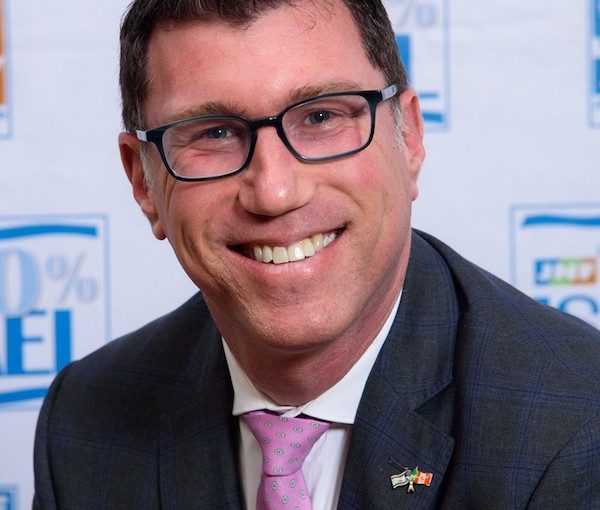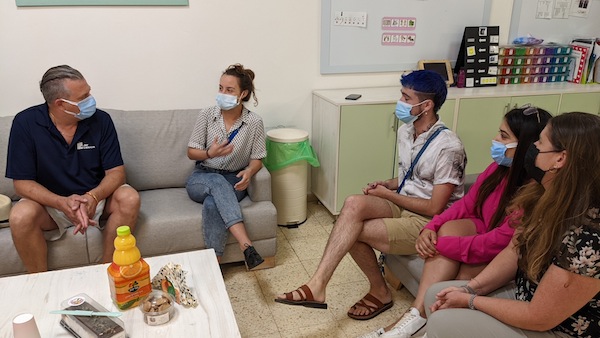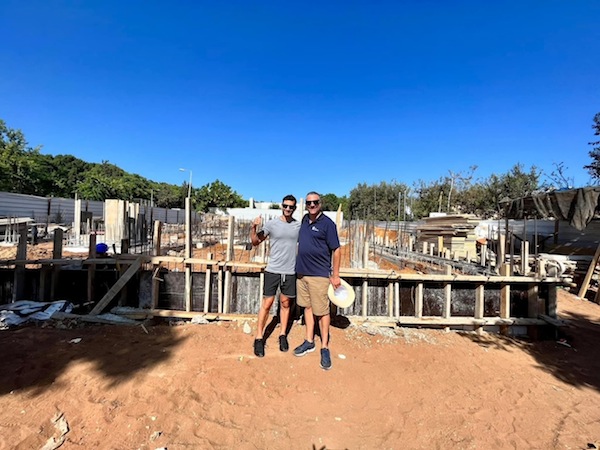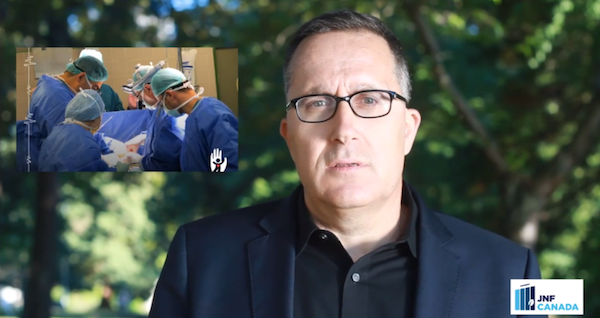Lance Davis, chief executive officer of JNF Canada (photo from JNF Canada)
Noa Tishby, an Israeli who hit it big in Hollywood as an actor, writer and producer before bursting on the scene as an activist voice for Israel, will be in Vancouver June 29. She is the headliner for the first Negev Dinner in Vancouver since the pandemic.
The Negev Dinner is a tradition of the Jewish National Fund of Canada, with annual dinners taking place for decades in regions across the country.
Michael Sachs, executive director of JNF Pacific region, says that Tishby’s upcoming visit is a response to demand.
“A lot of people in the community really want to hear from her,” said Sachs. “The rising antisemitism, as well as the delegitimization of Israel – these are issues that are forefront in our community.”
Tishby is, he said, “one of the best spokespersons for the state of Israel and for the Jewish community at large.”
With her 2021 book, Israel: A Simple Guide to the Most Misunderstood Country on Earth, the Los Angeles-based Tishby placed herself firmly in the realm of show biz activist, but on a topic that many public figures avoid. (See jewishindependent.ca/tag/noa-tishby.) Her entertainment industry work includes appearances on Nip/Tuck, Big Love and NCIS, and she is the co-executive producer of the HBO series In Treatment, an adaptation of the Israeli series BeTipul.
“To be able to have her in Vancouver, we just couldn’t miss out on it,” said Sachs, adding that this young, dynamic woman has an appeal that can expand the reach of JNF and the Negev event.
“We are also working on student pricing and we want ‘angel’ tickets,” he said. “The idea is to get as many people in our community in front of her so they can hear her message.”
This dinner will not have an honouree like such events have had in the past. Part of that is simply the desire by the organization to try different things but it is also because, with JWest, the redevelopment of the Jewish Community Centre of Greater Vancouver, and other projects, there are “a lot of asks” in the community right now, said Sachs.
While JNF has sent out “save the date” notices for June 29, the location is not yet set. The organizing committee is co-chaired by husband-and-wife team Mike and Lisa Averbach. The project to which proceeds of the event will be allocated is to be announced in the next few weeks.
While the June event will be the first JNF gala in Vancouver since the pandemic, some took place in other regions last year, said Lance Davis, chief executive officer of JNF Canada. He has witnessed some pent-up demand to celebrate with community again.
“When people get together during cocktails and they haven’t seen each other for such a long time, the hugs and the warmth – it’s wonderful,” he said.
During the pandemic, JNF held Negev “campaigns” – fundraising initiatives that did not involve in-person events. Despite the financial and social impacts of the shutdown, Davis said the organization’s revenues have rebounded to pre-pandemic levels.
“It’s a wonderful news story that we are bouncing back and moving in the right direction,” said Davis, who has been CEO of the national organization since 2017, following five years leading the Toronto region.
JNF Canada, like Jewish and pro-Israel individuals and organizations worldwide, is coming to terms with the changed political dynamic in Israel. Binyamin Netanyahu’s new coalition, frequently referred to as “the most right-wing government” in the country’s history, is shaking up the global discourse on the region. The resignation of Israel’s ambassador to Canada, announced last Saturday, is just one reaction in an uncertain new environment. Davis, like leaders of other organizations, is emphasizing neutrality and independence.
“I just want to state unequivocally that JNF Canada is nonpolitical and nonpartisan and, as such, we are going to continue to do our work regardless of who is in government,” he said. “We are mission-driven and that means simply building the foundations for Israel’s future. We will continue to help the land and the people of Israel as we have done for decades with left, right and centrist governments. Nothing has changed. Our resolve to enhance the lives of Israel’s citizens is not impacted by the current regime and this is the time for Diaspora Jewry to communicate with our extended family in Israel that we are indeed a family and as such we will always be there for them.”
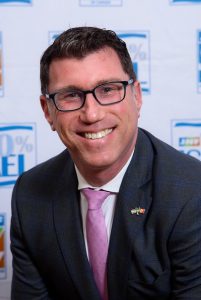
For all the ink spilled on the subject, Davis thinks the supporters of JNF Canada are sophisticated enough to understand the dynamics.
“For those people who say, I can’t be a part of this because I don’t support the government of Israel, I just hope that we can have a conversation with them,” he said. “You need not worry that one penny of that money goes to the government…. It’s only for charitable purposes and I think that if we are given the chance to explain this, people will understand we are nonpolitical and nonpartisan.”
The Israeli political climate may be a new variable, but JNF has not been without its critics over the years, some of whom accuse it of promoting Israeli “colonialism.”
“There is no question that there’s a whole host of anti-Israel parties who are taking an adversarial position,” he said. “I just wish that they would actually look at what we’re doing because is building a PTSD and health centre that serves all citizens, Jewish, Arab, Christian, Muslim, everybody – is that colonialism? Building a home for abused women with nowhere to go? It’s literally a lifesaving asset and, rest assured, Jewish Israelis and Arab Israelis will be using this facility – how is this colonialism? What exactly is it that they are protesting against?”
At a Negev Dinner in Vancouver a few years ago, which was raising funds to improve a facility for the most vulnerable sick kids in Israel, Davis saw protesters outside.
“I showed up at the dinner and I said, I wish these people understood what they were protesting against,” he recalled. “Because what you guys are doing is building a resource for the sickest kids, Jewish, Arab, Christian, Muslim – they’re all Israelis, they’re all welcome at this facility. Do they even understand what it is they’re upset about? And shame on them for protesting your efforts to build this facility for the most vulnerable children.”
One new initiative that Davis is particularly excited about is JNF Canada’s Climate Solutions Prize, a competition among Israeli researchers to fund breakthrough research focused on combating climate change.
“We’ve made an effort to raise $1 million a year over the next number of years,” he said. “We have a blue ribbon panel of scientists and engineers and businesspeople who review these researchers’ proposals.”
Last October, they presented the first awards, totaling $1 million US to the leaders of three research teams. Ben-Gurion University’s Prof. Itzhak Mizrahi and his team are working to ameliorate the methane emissions caused by cows. Dr. Malachi Noked of Bar-Ilan University seeks to reduce global emissions by improving ways to store renewable energy safely, efficiently, economically and in quickly accessible forms. Prof. Avner Rothschild of the Technion is working to produce green hydrogen through electrolysis of water.
Recipients are scientists who are well advanced in their work but need a boost in funding to achieve a breakthrough.
“This is the largest climate solutions prize that’s offered in Israel, by a long shot,” said Davis. “There are prizes to encourage green technologies, but in terms of the size and the scope, we are by far and away the largest prize.”
And, at this point, it’s an exclusively Canadian project. He hopes that other JNF organizations – there are about 40 countries with similar national bodies – will jump on board and make the prize a bigger success.
Israelis are renowned for successes in financial technology, cyber- and agri-tech, said Davis. “But, in terms of climate solutions, they really haven’t had a home run yet,” he said. “We felt that we need to give people a little push to get them over the top.”
Jewish National Fund of Canada was formally established in the late 1960s, but the iconic symbol of Keren Kayemeth LeIsrael, Jewish National Fund, the pushke, or blue box, has been in Jewish households in Canada and around the world for a century. The tin has been used for collecting coins that were forwarded to local offices around the world and combined to help build the nascent yishuv and then the state of Israel, beginning by planting trees and then expanding into all range of development projects.
Davis explained that JNF Canada is fully independent and not structurally connected with the Israeli organization.
“We are not a subsidiary,” he said. “We are not answerable to any other charity.… We get to decide what projects we take on. Canadians give money to things that they want to support and we bundle all that money from coast to coast and we take on projects.”
JNF Canada works with Keren Kayemeth LeIsrael on some initiatives but works with other charities on a range of undertakings.
“We, the Canadians, decide what we want to do and the Israeli entities are our agents,” he said. “They do the work for us. People often … have it reversed [thinking that] Israelis tell us what we need to do and we just do it. No, it’s the opposite. They work for us and that’s the way it should happen.”
Started in 1948, Negev dinners have taken place, usually annually, in Vancouver, Edmonton, Calgary, Winnipeg, Windsor, London, Hamilton, Toronto, Ottawa, Montreal, and Atlantic Canada. The name comes from the fact that the earliest dinners benefited projects in the Negev Desert. JNF Canada now funds projects throughout Israel, but the name has stuck.
“I think that when Canadians think about JNF a few things come to mind: trees, blue boxes and the Negev Dinner,” said Davis.

